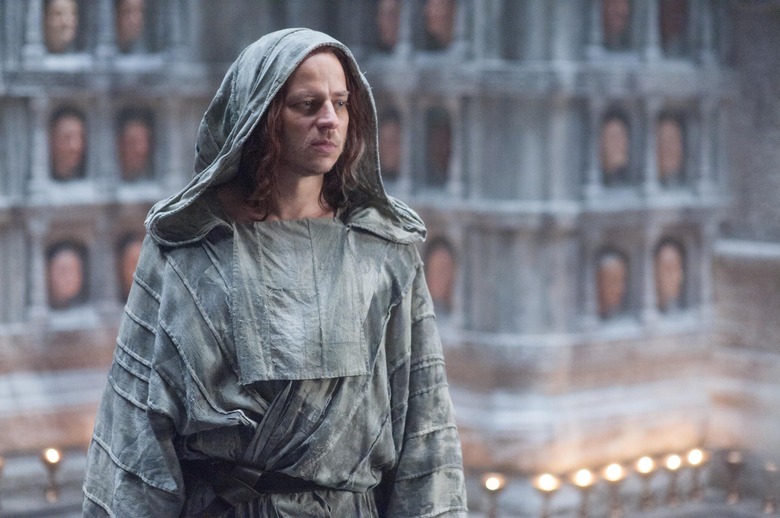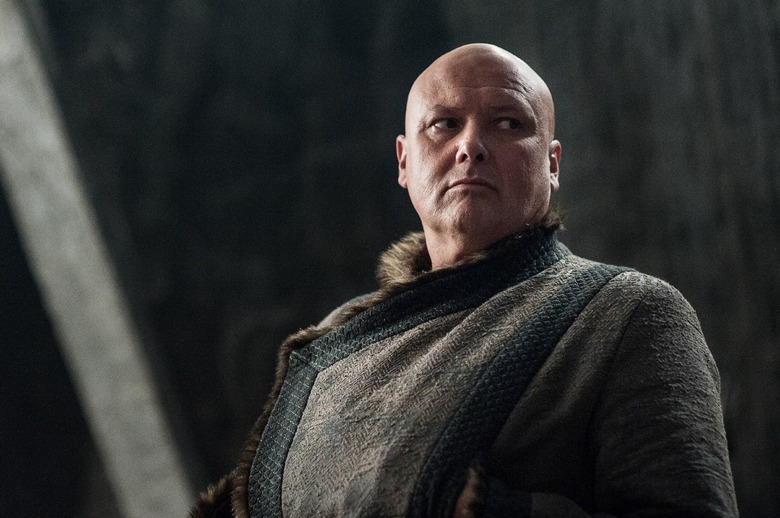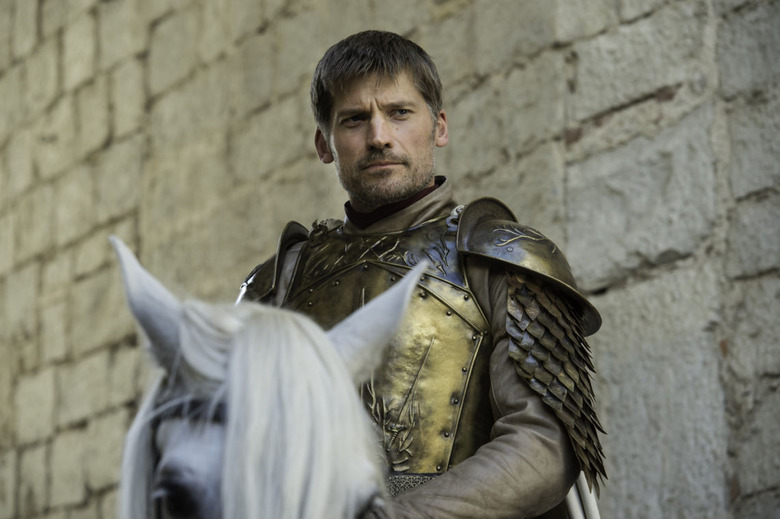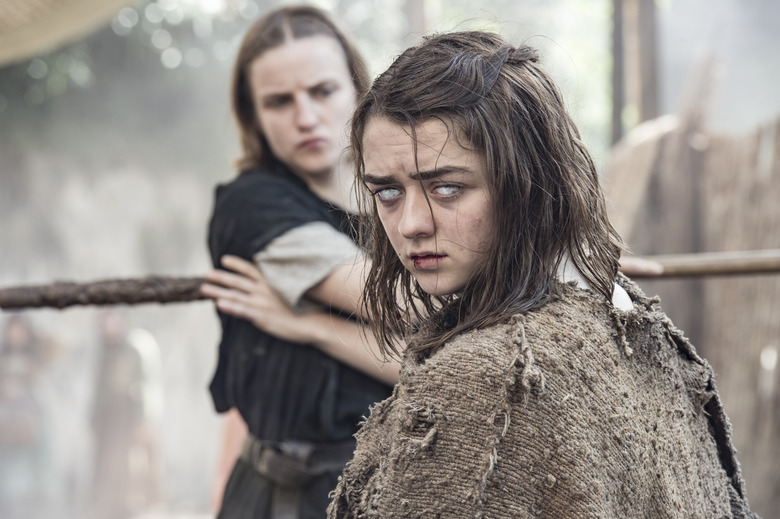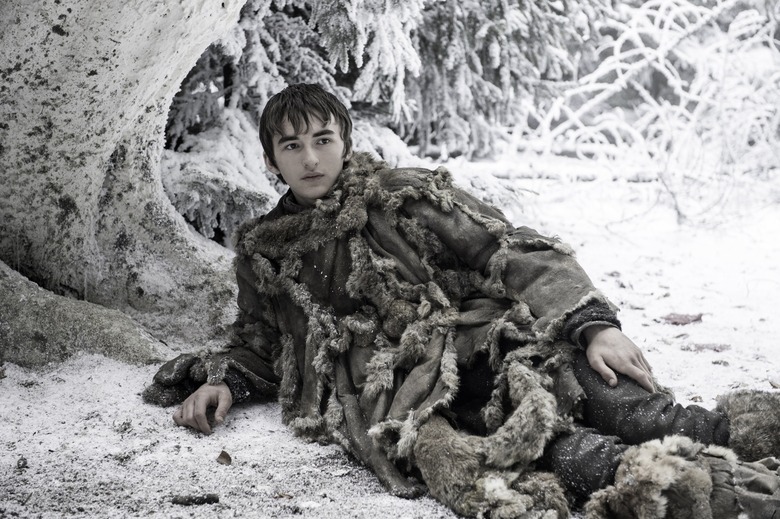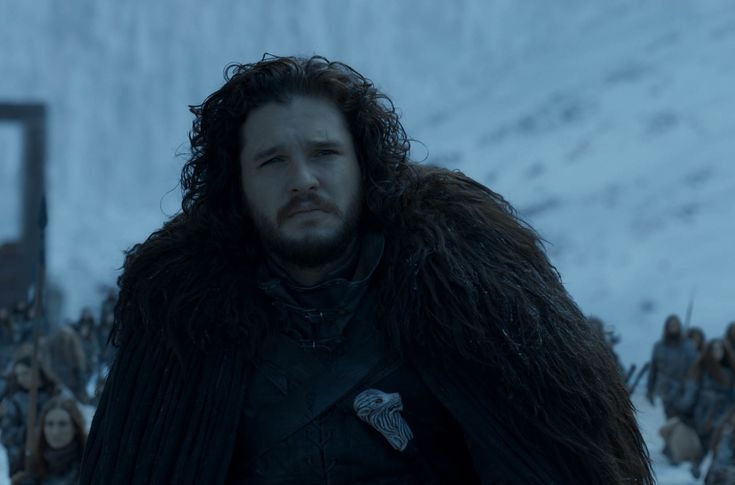What It's Like Rewatching 'Game Of Thrones' Once You Know How It Ends
It's been two weeks since Game of Thrones aired its series finale, not nearly enough time for even the most hardcore fans to go back and revisit the whole series to see how well it squares with the ending we got. Since a recent foot injury left me less mobile than usual, I, for one, found myself in the grips of an unquenchable need to process this pop culture event, while being physically unable to just "walk it off" like a normal person would. I had all this extra binge-watching time, a deeply renewed interest in the world of Westeros, and yet no new episodes (or, let's face it, novels) on the immediate horizon.
So of course, I did the only rational thing and promptly started revisiting old episodes, binge-rewatching Game of Thrones until I literally made myself queasy with entertainment consumption. Someone needs to invent a term for that sort of sickness. The binge-watch bends?
As unhealthy as it was, I came out the other side of my marathon viewing with a greater appreciation for the full trajectory of the show's characters. One of the narratives that has built up as part of the backlash against Game of Thrones is that it started betraying its characters toward the end, sacrificing logic and good character-based storytelling in favor of planned endings. When you've been watching the show from week to week over a span of eight years, it's easy to forget some of the smaller moments as your memory clings to its impression of the characters over time. The question is, who were they, really, and did the show do an effective enough job of communicating that?
The Many-Faced God(s)
My biggest takeaway from the rewatch was that Game of Thrones is a show about people at war with each other ... and at war within their own split selves. The main religion of Westeros is the Faith of the Seven, whereby George R.R. Martin reworked the Trinity of the Catholic Church as "one god with seven aspects." Apart from that, there's also the syncretic cult of the Faceless Men, which worships Death as a Many-Faced God.
Westeros is a world of many-faced individuals, characters who frequently display contradictory qualities. As a show-watcher, I realized I was so focused on one quality with certain characters that I perhaps recognized that as their defining trait, to the exclusion of other visible traits. It's not always easy to keep track of every little thing when you have a series that's as dense and diffuse as this juggling subplots.
Let's get the big one out of the way first. Let's talk about Daenerys. The day after the series finale, "The Iron Throne," aired, I wrote at length about Dany's arc and the broader cultural implications of it. Having gained some more distance from her city-destroying turn in "The Bells" and having rewatched the series in the interim, I can only say that for me as a repeat viewer, Dany's ending absolutely squared with her story as threaded throughout the series.
During the rewatch, I found myself focusing a lot on Emilia Clarke's line readings: the contents of her dialogue but also how she was saying it. Originally, I thought, well, maybe Clarke was playing one character and the showrunners had a different one in mind. Since she didn't have foreknowledge of the show's ending, that may be true to an extent, but there are definitely times onscreen when you can see Daenerys almost flip a switch in her eyes, softening or hardening her gaze as her inner dragon dictates.
A blank, pitiless look passes over face after she watches Khal Drogo pour the titular "golden crown" over her abusive brother's head in Season 1, Episode 6. We would see variations on that look pop up many times in the series. Sometimes Dany's eyes would come alive with "fire and blood," the very motto of House Targaryen, which she promised to rain down on her foes. As far back as Season 2, when she was outside Qarth, she threatened to "lay waste to armies and burn cities to the ground" after her dragons were grown. So why didn't many viewers, myself included, take those threats more seriously?
The empty bravado of war speeches — and dialogue in general — doesn't necessarily equal good characterization, even on a show like Game of Thrones, which began its life as dialogue-heavy (only to become less so in later seasons, as this graph shows). With Daenerys, however, as the show became increasingly more action- and visual-oriented, we also saw her putting words to action, sometimes to horrific effect. It was all well and good when she was in far-flung Meereen, crucifying nobles; but when she arrived in Westeros and her self-assured power quest started negatively impacting characters we care about like Sam and Varys, that's when we saw her brushing up against some much-needed character foils.
Lord Varys, Death by Dragon
Varys' main shtick throughout the series was talking about the good of "the realm." He was one of my favorite characters because he was one of the few who seemed to take a sober-headed macro view of Westeros. Yet he was also fundamentally two-faced, in a more deliberate, conscious way than Daenerys and other characters with a dual nature. His ever-shifting allegiance to kings and queens enabled him to survive long-term but it made it inevitable, perhaps, that he would eventually find himself in a spot where he had nowhere left to turn, no new alliances left to forge.
In his own way, the character became as much an absolutist as Ned Stark, with his unswerving loyalty to the realm taking the place of Ned's misplaced honor. It doesn't matter that he was right about Daenerys, not when his betrayal is part of what sent her over the edge. In Season 7, she promised to burn him alive if he ever betrayed her. He, in turn, swore to look her in the eye and not conspire behind her back if he ever thought she was failing the people.
He sorta-kinda tried to do that at one point in Season 8, but as soon as another desirable Iron Throne candidate presented himself in the form of Jon Snow, Varys broke his promise and went right behind Dany's back ... vying to pit her own lover against her, no less. We weren't even that far removed from him emphatically telling her, "I choose you," in Season 7 before this happened. Had this subplot and the entire Westeros stage of Dany's conquering career been drawn out over one or two full 10-episode seasons (in a manner commensurate to the time she spent in Meereen), maybe viewers would have been more inclined to see it as truly organic to the plot and her character.
As it is, if you could describe Daenerys in a single word, "imperious" might be the best fit (going by the Cambridge Dictionary definition of "unpleasantly proud and expecting to be obeyed.") That's too reductive, of course: Dany undeniably has a good side. This side comes out more when she's surrounded by trusted advisers who can, however briefly, temper her worst impulses.
By the end, that layer of character insulation is stripped away and Daenerys comes to King's Landing as a would-be liberator who is, in fact, liberated from her own senses. There's no one up there in the air, on the back of that dragon with her, to talk her down from turning the city into a scene that evokes the ash-covered streets of 9/11. She becomes the queen of the ashes, the very thing that she and people who believed in her, like Tyrion, kept saying she wasn't there to be. Her final Nuremberg-esque rally on the steps of the destroyed Red Keep feels very much of a piece with other stentorian speeches we have seen her give.
When I went looking for Dany's bad side in the rewatch, I didn't have to look far. It's there in the dialogue, it's there in her eyes, and it's there in her actions.
The Real Jaime Lannister
Daenerys isn't the only character whose ending squares more soundly on a rewatch. Two other prominent examples are Jaime and Arya. Like Daenerys, Jaime has been lifted up as a prime example of a character whose development was thrown out the window—much like when he pushed young Bran out the window in the pilot episode of the series. Will the real Jaime Lannister please raise his golden hand?
From the moment she beat him in a sword fight on a bridge in Season 3, Brienne of Tarth began to have a noticeable effect on Jaime. She helped sand off some of the character's rough edges, making us believe in his redemption, despite the fact that this was a man who crippled a boy and killed his own cousin, among other things. As late as Season 6, however, we had that scene in the tent outside Riverrun between him and Edmure Tully, reminding us of his more monstrous, selfish, Cersei-loving aspects.
Was Jaime lying in "The Bells," when he delivered that questionable line, telling Tyrion, "To be honest, I never really cared much for [the people of King's Landing]. Innocent or otherwise?" This would seem to overtly clash with his backstory as the knight who killed the Mad King to save the city. That decision, which he relates to Brienne in a Harrenhal hot tub, saw him branded as the Kingslayer. It would haunt him his whole life.
If you think of Jaime as a character who's been burned (if not actually dragon-toasted) by his sacrifice on behalf of others, it makes sense that he would feign not caring or be in denial about the better part of his nature (since on a personal level, it only brought him the misery of a ruined reputation). As I watched him return to King's Landing, then leave again, then return — as if there were a yo-yo attaching him to Cersei — I constantly asked myself as a member of the Night's (Re)Watch: was this the same Jaime Lannister who would go running back to his sister when he realized that death by dragon was coming for her?
Most of the time, the answer was yes. That side of him was there, even when Brienne was bringing out the good side of him.
It was arguably a misstep on the part of the writers to suddenly sexualize Brienne (like every other woman on the show) and have her and Jaime consummate their relationship in bed, as if two grown-ups couldn't form a platonic bond and have just as meaningful effect on each other. Jaime's fireside knighting of Brienne in Season 8 was the real consummation; they even named the episode, "A Knight of the Seven Kingdoms," after it. Maybe it would have been more believable if Jaime, driven by a need to prove himself to Cersei, had charged right into his own death by dragon in "The Spoils of War"—instead of sinking to the bottom of a river, only to resurface right away next episode with his plot armor intact.
Jaime and Cersei are the very portrait of a bad relationship. With Brienne, Jaime is able to experiment with a healthy relationship, but he's so attached to his one, true, twisted love, Cersei, that he keeps circling back on her and House Lannister in a vicious loop of codependent twincest. In "The Iron Throne," watching Brienne selectively edit Jaime's Wikipedia page, playing up his noble qualities in the annals of the Kingsguard, serves as a reminder that history is written by the survivors.
By excluding his bad qualities (no mention of the murdered cousin Alton), it also serves as a reminder that this character, like many others on Game of Thrones, was a self-destructive mixture of good and bad. That he came down on the side of Cersei at the end isn't a symptom of the show's quality decline ... unless you want his entry in the book to be inked that way. It just goes to show that we, like Brienne, wanted to believe the best about Jaime.
Arya Stark and the Road to Revenge
Arya spent much of Season 3 and 4 on the road with the Hound. Season 5 and 6 took her on a long detour to Essos, where she trained to be a Faceless Man and got struck blind. To be honest, I was never all that interested in this subplot and never understood the point of Arya's journey until the final season and a series rewatch re-contextualized certain parts of it. This hit home the most in Season 6 when she was sent to assassinate a stage actress, Lady Crane—who also happened to be playing Cersei, one of the names on her kill list.
We watched as Arya watched a re-enactment of events on HBO, like Ned Stark's beheading and the Purple Wedding. In her own way, she was playing a part, too: trying to cast off her individuality, to abandon her humanity, by becoming "no one." The problem is, she came to sympathize with Lady Crane—even with Cersei's revenge need as a mother.
Overcoming the nigh-unstoppable, Terminator-like Waif and embracing her own identity as Arya Stark again enabled her to escape back to Westeros as an individual with a stronger sense of self. She was still obsessed with revenge, of course, and this would see her bring a brutal end to House Frey in the Assassinations at the Twins. In Season 7, choosing to go back to Winterfell where Jon is, instead of heading the other direction to King's Landing to kill Cersei, is another crucial moment for her. Here again, as in Essos, we see her coming back to herself, embracing her family identity instead of the lust for blood.
All the training she undergoes in the series pays off when she defies death ("Not today") by killing the Night King. Everyone loves a good revenge fantasy, so it might have been satisfying to see Jaime unmask as Arya and kill Cersei in the map room at King's Landing, as well. However, that's not the story that the show has been telling with Arya. It wants to show her — as it does with the Waif and with the street holocaust scenes caused by Dany and her dragon — that the quest for revenge as self-actualization can unleash forces that are beyond one's control.
With the Red Keep crumbling around her, it's not so unrealistic that Arya would turn back at the last moment, right as she's on the cusp of finally catching up with Cersei. She and the Hound have formed this gruff affinity for one another. They're both obsessed with their own personal vendettas until Arya, who has already begun drifting away from hers, has a moment of clarity where she sees what his lifelong hang-up has done to him.
He dies in Cleganebowl, cackling at the absurdity of his un-killable brother, this Mountain of revenge he's been climbing his whole life. The only way for him to beat it is to plunge himself over the edge and into the fire with it. She goes another way, tapping back into her desire for exploration, which she had already communicated to Lady Crane in Essos and which sees her sailing beyond the edge of the known map in the series finale.
One REmake to Rule Them All
Chalk it up to binge-rewatch delirium, but I've been less critical here than I was when I recently argued that the best and worst aspects of Game of Thrones serve as a time capsule of the 2010s. I think Game of Thrones is a show that may hold up better for some people when you watch it all the way through, as opposed to over a long period of time. There's a much clearer throughline when you have things from previous episodes and seasons fresh in your mind.
Be that as it may, the show is not without its flaws, some of which are glaring. Everyone has his or her least favorite episode. By far, the most egregious example, for me, of the show abandoning logic in its race to the finish line came in the Season 7 episode, "Beyond the Wall." This was the men-on-a-mission episode that saw our band of hardscrabble heroes attempt to capture a live wight.
They were apparently accompanied by several redshirts, even though the camera never bothered to visually establish those expendable wight targets before dispatching them. Add to this how ridiculously fast the ravens and rescue dragons started flying near the end, and yeah, the whole thing pretty much felt like a thinly plotted farce (notwithstanding the cool coda of a dragon resurrection).
As spectacular and big-budget as it became, the show's production value has already not aged well in spots. An amateur, TV-ish quality does occasionally shine through in the makeup and costumes of extras (and Sand Snakes), who look like they could have walked right off the set of Xena, Warrior Princess. I also found myself growing annoyed with the time devoted to certain characters, like Theon Greyjoy, whose hapless misadventures as a torture victim left him so traumatized that he wound up repeatedly screwing over his sister (not in the Lannister sense).
Speaking of time devoted to characters, as much I'd love to do a Debate of Thrones epilogue making the case for Bran the Broken, I'm not sure I could really justify it. The show never put Bran — or poor Rickon — on equal footing with the other Stark cubs. In case anyone's forgotten, Bran actually disappeared from the show for an entire season. If they wanted to crown him King of the Six Kingdoms and make Tyrion's "No one has a better story ..." spiel at the end feel earned, they shouldn't have consistently backgrounded Bran in favor Arya, Sansa, and Jon. Even in the last moments of the finale, we saw it weighting itself toward them and their endings. Bran was never more than a D'artagnan to their Three Musketeers.
Despite offering up masterful moments of stillness, the most disappointing aspect of the series finale to me was how much it ended up feeling like a remake of The Lord of the Rings: The Return of the King. You've got the four surviving Stark kids on the docks in place of the four Hobbits and you've got Sam (his name itself being a LOTR callback) trotting out a tome with the meta title of A Song of Ice and Fire. For its part, the Iron Throne gets not-so-subtly melted down like the One Ring of Power.
Moments like these evoke the same satisfactory feeling as Return of the King — the other great fantasy ending of our time — but they also somewhat undermine the series by landing in a safe place, giving us clear echoes of moments we've already seen onscreen before. This goes against the subversiveness of early seasons when characters weren't protected by plot armor and there was no telling who would survive the game of thrones. Dany's final fate arguably maintained the show's subversive streak right up until the bitter end, but of course, she's Gollum in all this.
It's an odd thing in the month of May when the Marvel Cinematic Universe — which started out more formulaic — winds up feeling more original with its mega-movie finale, Avengers: Endgame, than Game of Thrones does with its series finale. Yet if we're being honest, at present, only the MCU (and maybe Star Wars, with the end of the Skywalker saga later this year) could claim to surpass the cultural clout of Game of Thrones.
There's never been a show with the sheer impressive vision and scale of this one on television. This extends right on down to the musical level. By turns airy and thunderous, Ramin Djawadi's compositions lent Game of Thrones the orchestral texture of a sweeping epic. If the show did, in some sense, wind up feeling like a conscious Tolkien remake at the end, then amid the other remakes and reboots of the franchise-filled 2010s, this is the one that ruled them all.
North of the Wall and West of Westeros
Game of Thrones certainly had some issues with its treatment of women. I had forgotten, for instance, how Season 6 brought back the wildling woman, Osha, only to treat her as a swift murder object for Ramsay Bolton. Despite such nastiness, the very last words we hear spoken on the show (after the setup to Tyrion's series-long unfinished joke about a jackass and honeycomb in a brothel) are, "The Queen of the North!" The finale puts a crown on the head of Sansa, a rape survivor. It crosscuts with her sister — who destroyed the Army of the Dead and saved the world of the living — sailing "west of Westeros."
Meanwhile, in the South, their brother, a disabled young man, is left to rule from a wheelchair instead of an Iron Throne. A visibly scarred dwarf is his Hand of the King and a woman, perhaps the first female knight in Westeros, is the Lord Commander of his Kingsguard. One of the show's few black characters, a eunuch, transitions from being a slave and soldier to the Master of War who is left in command of Dany's forces.
The well-meaning, honorable, but ultimately kind of vanilla Jon Snow goes into exile, and maybe that's where pop culture is heading, post-Game of Thrones. These endings don't negate some of the issues with representation that are present in the series as a whole, but they do feel true to a story with a tender spot in its heart "for cripples, bastards, and broken things" (which is what the show told us it was at the beginning).
As for me, I'm north of the Wall now, too, looking back on the gate as it's closing. Where are you in Westeros ... or have you gone west of it, also?
I don't know if I'll ever find time in my life to rewatch Game of Thrones as a series again, but I might be inclined to revisit some of its best episodes, and I'm very interested now to dive back into the world of Martin's novels. With another HBO series in the works, set thousands of years before this one during the Long Night, the franchise is — like Star Wars and The Lord of the Rings and Harry Potter before it — already headed down the prequel path.
That doesn't usually end well for franchises, but who knows. As it goes into prequel/sequel mode with this and Watchmen, maybe the Home Box Office network will be the one to finally break the wheel. Or maybe this franchise has already burned itself to the ground so that it no longer holds any utility for our lives as entertainment.
It's too early to tell which way the winds will blow. In the grand scheme of things, how will Game of Thrones compare to other prestige TV dramas with more well-received endings like Breaking Bad?
The show itself anticipates this question rather obviously with a meta line from Tyrion. As he says at the end: "Ask me again in ten years."

